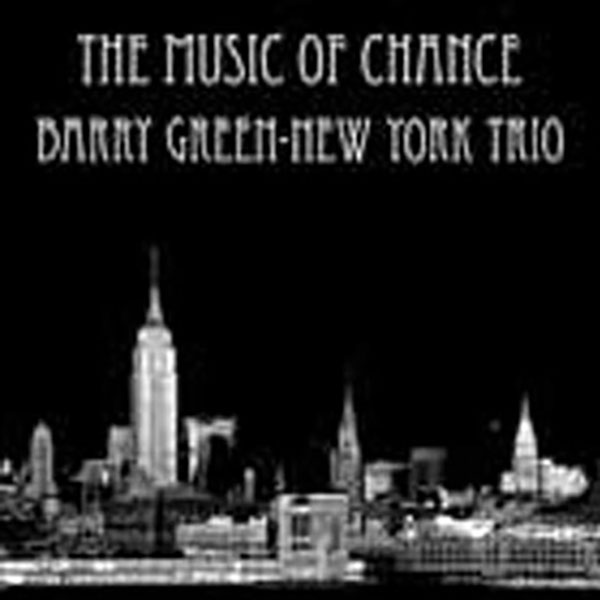
by Ian Mann
March 11, 2009
/ ALBUM
An album that should hold plenty of appeal to all fans of contemporary jazz piano
I received this CD from pianist Barry Green at the recent Martin Speake’s Generations concert in Abergavenny (http://www.thejazzmann.com/reviews/review/martin-speakes-generations-live-kings-arms-abergavenny-01-03-2009/). It was issued last November and is the first release on Green’s own Moletone label. The personnel includes expat American drummer Jeff Williams, also a member of Speake’s generations group, and US bassist Ben Street.
London based Green trained at London’s Guildhall graduating in 2002. He now teaches there combining this with a career as a versatile jazz pianist who is comfortable in a wide range of contexts, from regular membership of Ingrid Laubrock’s groups to playing standards with Bobby Wellins. “The Music Of Chance” is Green’s second album as a leader. The first, “Introducing Barry Green” appeared on drummer Clark Tracey’s Ten To Ten label and featured a mixture of standards and original pieces played mainly as a series of duets with the likes of Laubrock and Speake, singers Christine Tobin and Anita Wardell plus Dave Whitford (bass) and Seb Rochford (drums).
“The Music Of Chance” is more standards orientated with only one original piece from the pen of Green. In this sense it is pretty much an orthodox piano trio record but Green and his colleagues find plenty to say in their interpretations of their chosen material. Green is an inventive and resourceful pianist and his playing is full of ideas. He is well served by a flexible and imaginative rhythm team. Williams, who has worked with the great Dave Liebman among others, has matured into a fine accompanist and bassist Street also makes a good impression.
The opening “Alone Together” gives all the trio members a chance to stretch out with Williams and Street very much acting as equal partners in the music making process. Green has good grasp of jazz piano history, he manages to reference both Bill Evans and Thelonious Monk in his playing, and his solos seem to unfold organically. The support of Williams and Street nurtures this process and the trio always have something interesting to say. The obligatory bass and drum interludes hold the attention thanks to the imagination of the players and both are well represented on this engaging opening number.
Bass and drums are also prominent on the trio’s remarkable deconstruction of Stevie Wonder’s “I Believe”. Green delicately sketches the melody above churning bass and chattering drums. It’s an interesting juxtaposition and one that works very well although it may take a couple of listens to really get into it. This is true of much of Green’s music, repeated listening regularly exposes new facets of his restlessly intelligent and imaginative playing.
Green’s original “So Stupid” is a gently probing abstract ballad paced by the leader’s leisurely piano musings. There is a particularly fine dialogue between piano and drums with Williams deft playing notable for his excellent cymbal choices. Street supports intelligently and occasionally takes the lead in a piece that makes effective use of the spaces between the notes.
“I’ll Be Seeing You” is a feature for Street’s agile bass playing but there is also another outstanding solo from the talented Green.
Thelonious Monk’s “Played Twice” is Green’s homage to one of his most important influences. However this is far more than mere pastiche, Green brings plenty of himself to the tune with Street and Williams also making substantial contributions.
The melody of Gershwin’s “Someone To Watch Over Me” is explored at length by Green in an extended solo piano intro. It’s another example of the trio coming up with something fresh to say on one of the most familiar items in the standards canon.
“You’re My Everything” and the closing “Subconscious Lee” (one of Mr. Konitz’s punning titles) offer the trio further opportunities to demonstrate their now well established style. There is some sparkling playing and great interaction all round.
Personally I’d like to have heard a bit more original material but nonetheless the interplay between the members of the trio is consistently interesting and absorbing throughout their chosen programme. “The Music Of Chance” is not an album that shouts to grab your attention but every listen seems to throw up something fresh and rewarding. Green is a remarkably mature player with an individual style that seems to work well in virtually any context. Always busy he is an inspired soloist and should become an increasingly important figure on the UK jazz scene.
“The Music Of Chance” is an album that should hold plenty of appeal to all fans of contemporary jazz piano. It is available from Barry’s website http://www.moletone.com
blog comments powered by Disqus